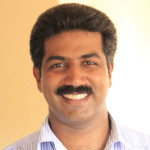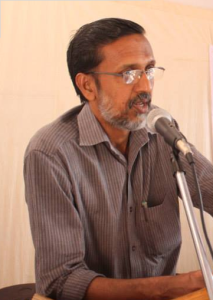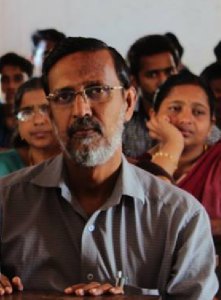 K.T.Mohandas, a 54 years old Mathematics Teacher and former educational officer, lives in Kerala, India. He has taught more than thirty-thousand students in his thirty-year career. The teachers in the village schools in India can sometimes seem like Emperors in their own villages, but for the most part they remain unknown to people outside that one area. Mr.Mohandas was such a teacher, until his school received the prestigious award for best Parent Teacher Association in Kerala State. Now, many school authorities turn to K.T. Mohandas for the comprehensive ‘Medicine’ they need to make their own schools a success.
K.T.Mohandas, a 54 years old Mathematics Teacher and former educational officer, lives in Kerala, India. He has taught more than thirty-thousand students in his thirty-year career. The teachers in the village schools in India can sometimes seem like Emperors in their own villages, but for the most part they remain unknown to people outside that one area. Mr.Mohandas was such a teacher, until his school received the prestigious award for best Parent Teacher Association in Kerala State. Now, many school authorities turn to K.T. Mohandas for the comprehensive ‘Medicine’ they need to make their own schools a success.
 I met Mr. Mohandas early in my career. I became a high school teacher in 2006 when I was 28, after having already gained 4 years experience teaching University students. I had many prejudices about teaching in a high school and about high school students at that time. But K.T. Mohandas guided me to a different path, the right path…a path on which receiving love from the world is more important than earning a large salary. I remember one evening, we were staying late at the campus to plan for our December Intensive Student Camp, and Mr. Mohandas started to tell me stories of students who came to school for the free noon meal we served. He pointed out that the students might not be interested in school itself at first, but when they did enter our school, that gave us our chance. It was an eye-opener for me. It gave me the opportunity to rethink so many of the things that were going on with my students and in the world around me. From Mr. Mohandas, I learned that teaching is not a business but a service, a service not to just your students, but to humanity.
I met Mr. Mohandas early in my career. I became a high school teacher in 2006 when I was 28, after having already gained 4 years experience teaching University students. I had many prejudices about teaching in a high school and about high school students at that time. But K.T. Mohandas guided me to a different path, the right path…a path on which receiving love from the world is more important than earning a large salary. I remember one evening, we were staying late at the campus to plan for our December Intensive Student Camp, and Mr. Mohandas started to tell me stories of students who came to school for the free noon meal we served. He pointed out that the students might not be interested in school itself at first, but when they did enter our school, that gave us our chance. It was an eye-opener for me. It gave me the opportunity to rethink so many of the things that were going on with my students and in the world around me. From Mr. Mohandas, I learned that teaching is not a business but a service, a service not to just your students, but to humanity.
 Early on, I noticed that Mr. Mohandas always took the utmost care to understand the problems of all his students. When former students visited the school Mr. Mohandas called each one by name, even students who he taught and who graduated 25 years ago. He tried to impress upon me that learning and remembering each students’ name is important because while a school has a responsibility to the society in which it is built, so too does the society have an obligation to pay attention and be involved with the school. To ensure this happens, teachers have to help students feel connected to the school long after they have graduated.
Early on, I noticed that Mr. Mohandas always took the utmost care to understand the problems of all his students. When former students visited the school Mr. Mohandas called each one by name, even students who he taught and who graduated 25 years ago. He tried to impress upon me that learning and remembering each students’ name is important because while a school has a responsibility to the society in which it is built, so too does the society have an obligation to pay attention and be involved with the school. To ensure this happens, teachers have to help students feel connected to the school long after they have graduated.
Mr. Mohandas’ innate passion for teaching eventually compelled him to leave his position as an educational officer to join the Government Higher Secondary School, Chorode as Headteacher 4 years ago. He agreed to my request for an interview for the iTDi blog and added that he has met Steven Herder online for the inauguration of his school’s IT Club and virtual classroom. The Interview has been lightly edited for clarity and brevity.
Can you tell me about your school?
My school (Government Higher Secondary School Chorode,Kerala)is situated in Kozhikode district of Kerala. We have classes from 8th Standard to 12th. It is the first wi-fi campus higher secondary school in the state and we also rank top in online activities.
I have heard much from you about your involvement with the wider community outside of your school How does this increased involvement of the wider society of the school effect the students?
When a person who has no visible direct connections with the school starts to help us in school activities by participating in Weekend Home Visits or by joining a Regional Level Local Educational Committee, first it is the students who develop a kind of conscience. They begin to think that they are involved in a very important, a very great business. And they also become more aware of their responsibilities within society. We have many ward level committees to check up on the students’ learning and development by visiting students in their homes. The ward level committee members also help provide solutions for students who are experiencing problems, if necessary.
You make extensive use of the specialists in the community, with members of the legislative assembly, engineers, and many others participating in school planning and other endeavours. How do you connect community members up with your school?
It is very simple.We have nearly 35 thousand alumni of our school. And many of them are well respected people. So, if we can get their help, it becomes much easier to plan activities. And the thing is, they are ready to help, if asked. They are even prepared to offer financial assistance to the school.
How did you go about applying for an award for the best PTA in the state?
This actually was my dream. At first we—the teachers, non-teaching faculty, parents, alumni and local community members—got together and made a master plan. We decided to focus our attention on three areas. Then we came up with three projects to help improve in those three ares. This resulted in the:
- Academic project named STEPS (Special Talent Achievement Programme for Students)
- A project for infrastructure development
- The Green Campus Project (a beautification project)
It took nearly three years to implement the plan and complete the construction work. And then we applied for the award.
Can you tell me about the Teacher Empowerment Programmes in your school?
We have many programmes, but I would like to tell you a bit about the Core-Oxford Project, which is one of them. It is a Teacher Empowerment Programme run in conjunction with the University of Oxford and the support of SCERT (The State Council of Educational Research and Training) Kerala. At present,ten of our teachers participate in the programme. They can log into the University of Oxford website and clarify any doubts they might have with the resources of the academic world of Oxford. Prof.David Johnson, Bob Ballard, Mike Taylor and P.T. Jenny Hsieh regularly interact with our teachers and provide all the assistance they might need.
Whats your next plan?
I have a number of enthusiastic teachers working together with me. Our next plan is to make our school the first paper free School in Kerala State. The initial talks have already begun. When we start a new project like this we start out by believing in it’s success. We start out by saying, ‘Let’s do it.’

